Course Information

RESOURCES
> WHAT TO EXPECT (Food, Solo, Crew, Instructors)
> DIVERSITY & NON-DISCRIMINATION STATEMENT
> ELIGIBILITY CRITERIA FOR WILDERNESS-BASED COURSES
CONTACT US
We look forward to having you on course with us soon! If you have questions about the application process, submitting forms, or anything else, you may contact your student services representative directly, call the Student Services General Line ,(800) 878-5258 or email us at, [email protected].
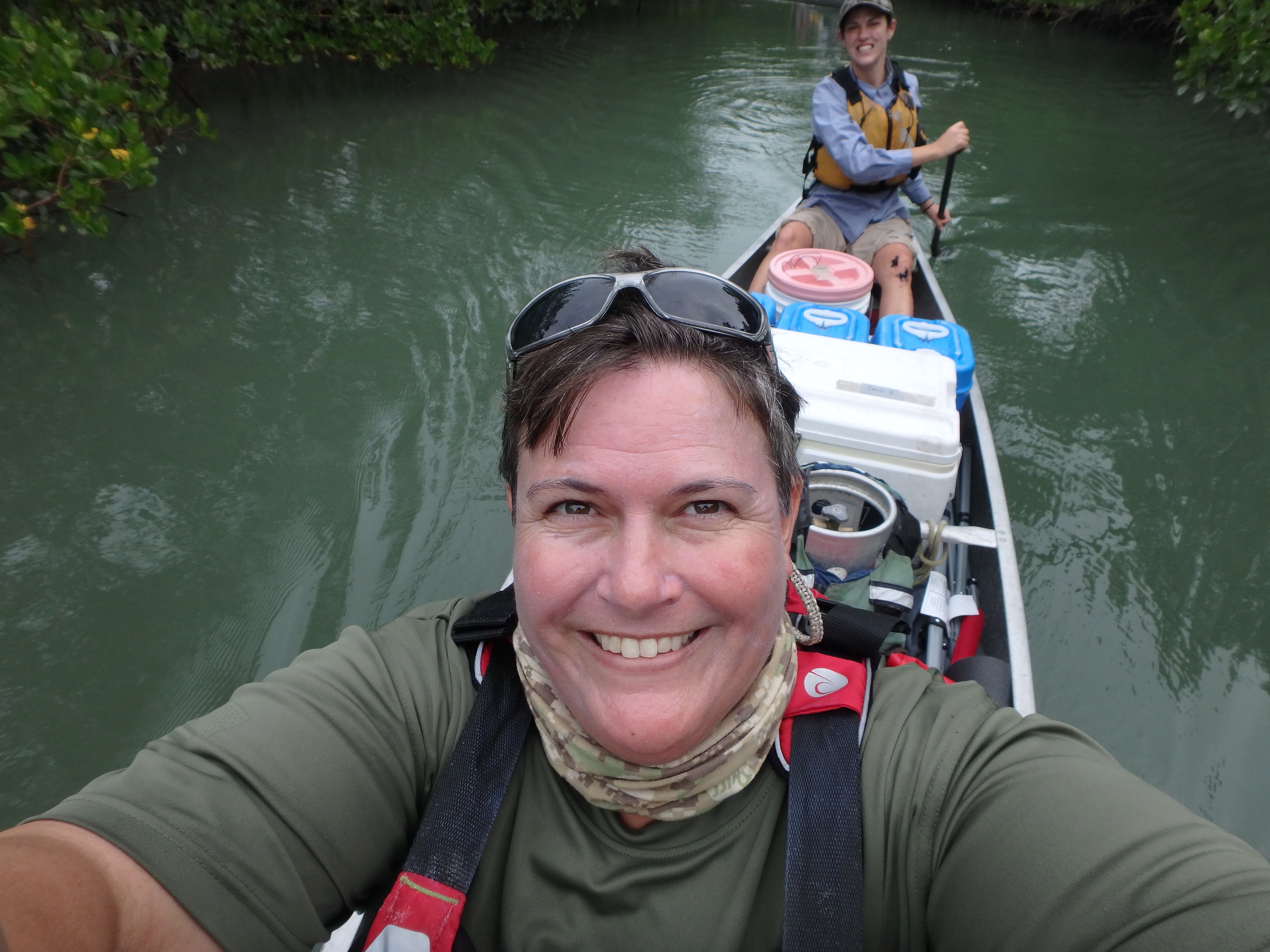
We are pleased you have begun the process that will lead you Outward Bound.
Our veterans courses are designed to help ease the often difficult transition home by drawing on the healing benefit of the wilderness, teamwork, and challenge.
This is a back country wilderness expedition, not a vacation or a retreat. You will be camping outside under tarps or in tents and will not have access to showers or bathrooms. We operate in all types of weather conditions. You will have the opportunity to discuss your service experience in a supportive, non-confrontational setting surrounded by fellow veterans while experiencing the beauty of the country you have served.
Our courses are suited for those in good physical condition and are opportunities for veterans to:
- Re-experience many of the positive aspects of military service through challenge and teamwork
- Develop skills to assist them in adjusting to life at home
- Candidly discuss obstacles faced by veterans
- Rediscover their physical and emotional strengths
- Help translate military values and commitment to service in a civilian environment
- Enjoy a unique and inspiring adventure surrounded by fellow veterans in the beauty of the country for which they have served
This course web page contains all the information needed to prepare for your wilderness adventure. Please bookmark for future reference.
Ten Thousand Islands Canoeing for Women Veterans
Course Number
NEVC-921
Date
January 06, 2019 - January 11, 2019
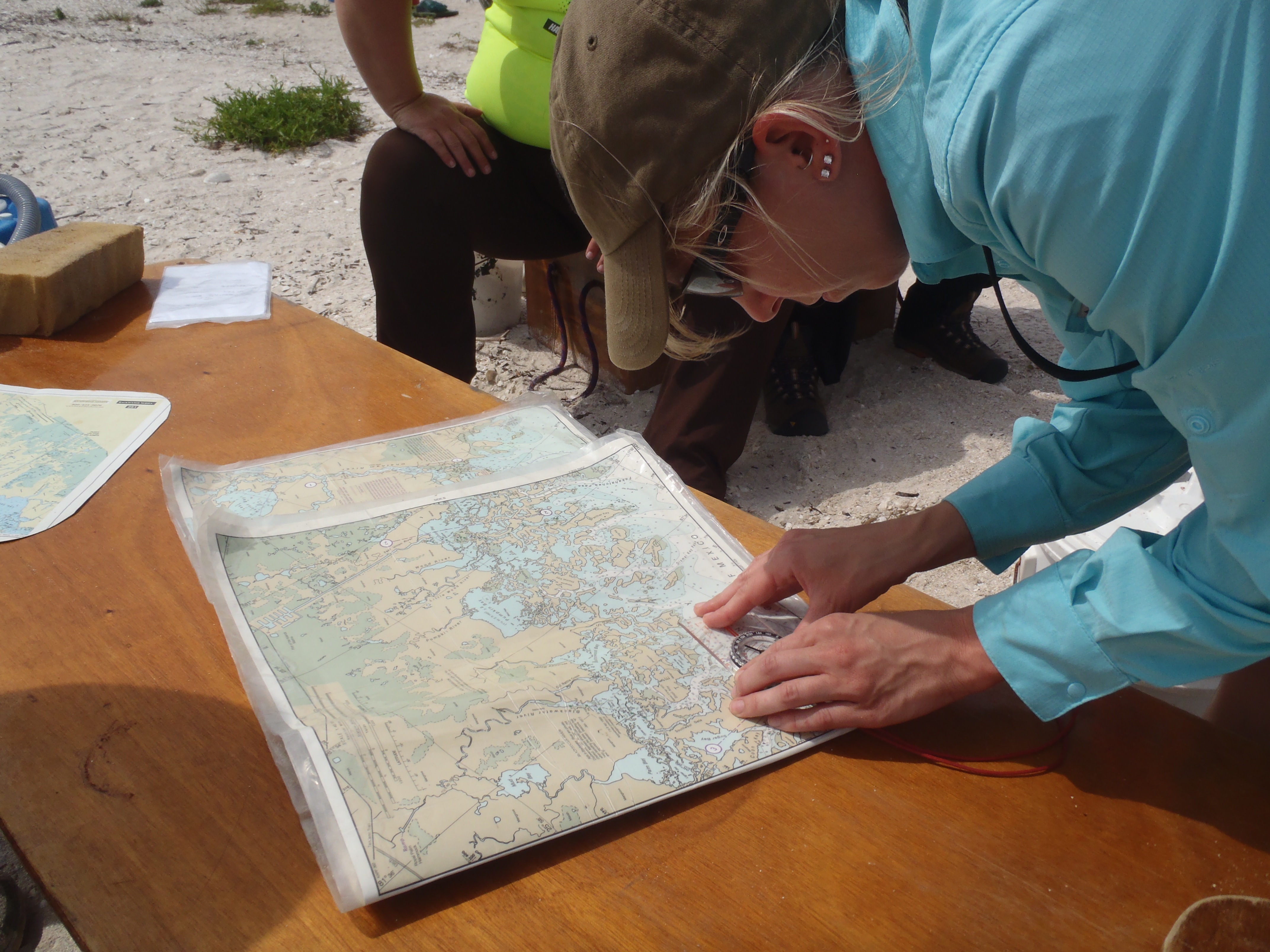
For over 30 years, Outward Bound has run wilderness expeditions specially designed for war veterans and service members. Outward Bound draws on the healing benefit of teamwork, challenge, friendship and the natural world. These courses provide a unique opportunity for self-discovery that can help veterans with their transitions back into civilian life.
CANOEING
You can expect to spend a good deal of time each day in canoes. You will be in a tandem canoe, which means there are two participants per canoe. Depending on the wind and weather, the level of difficulty will vary day to day. You and your crewmates will learn or practice:
- expedition risk assessment and management
- route planning and navigation
- paddle strokes and techniques for propulsion and steering
- canoe-based assisted rescues and self-rescues.
- canoe expedition equipment use, care and maintenance.
- how to work with your paddling partner
It will be necessary for you and your crewmates to perform a swim assessment; as well as a flip and swim assessment as practice for paddling and self-rescue. This activity is closely monitored by your instructors. It is critical for us to determine your paddling comfort as you and your crew explore the area. Even if you are a non-swimmer or weak swimmer, you will still participate in this safety assessment. All students will be wearing personal flotation devices (PFDs) during the assessment. Personal flotation devices (PFDs) are required apparel anytime students are on the water.
SOLO - SELF REFLECTION
Solo typically occurs more than halfway through your course and may last up to 24 hours. Your instructors will assign each participant an individual campsite within a designated area. Your instructors will teach you procedures to follow during solo and monitor you during this experience. You will know the location of your instructors’ campsite should you need to contact them; otherwise it is essential that you remain in your designated area. If your course has an overnight solo you will have your clothing, food and water. In addition, you will have Outward Bound issued gear: including rain gear, shelter, sleeping bag, compass and whistle. You will not be physically active during solo, as solo is a time for rest, recharge and reflection. Solo is also a good time to write in the journals we provide. If you have questions or concerns, please discuss with your Student Services Representative or your instructors.
FINAL CHALLENGE EVENT
At the end of your course, you will participate in a personal challenge event. This is a great time to see how much your physical fitness and endurance have improved since you began your course. This event will be a running activity. It is not a race. Your instructors set a certain route for your crew and you complete the route at a level that will challenge you the most.
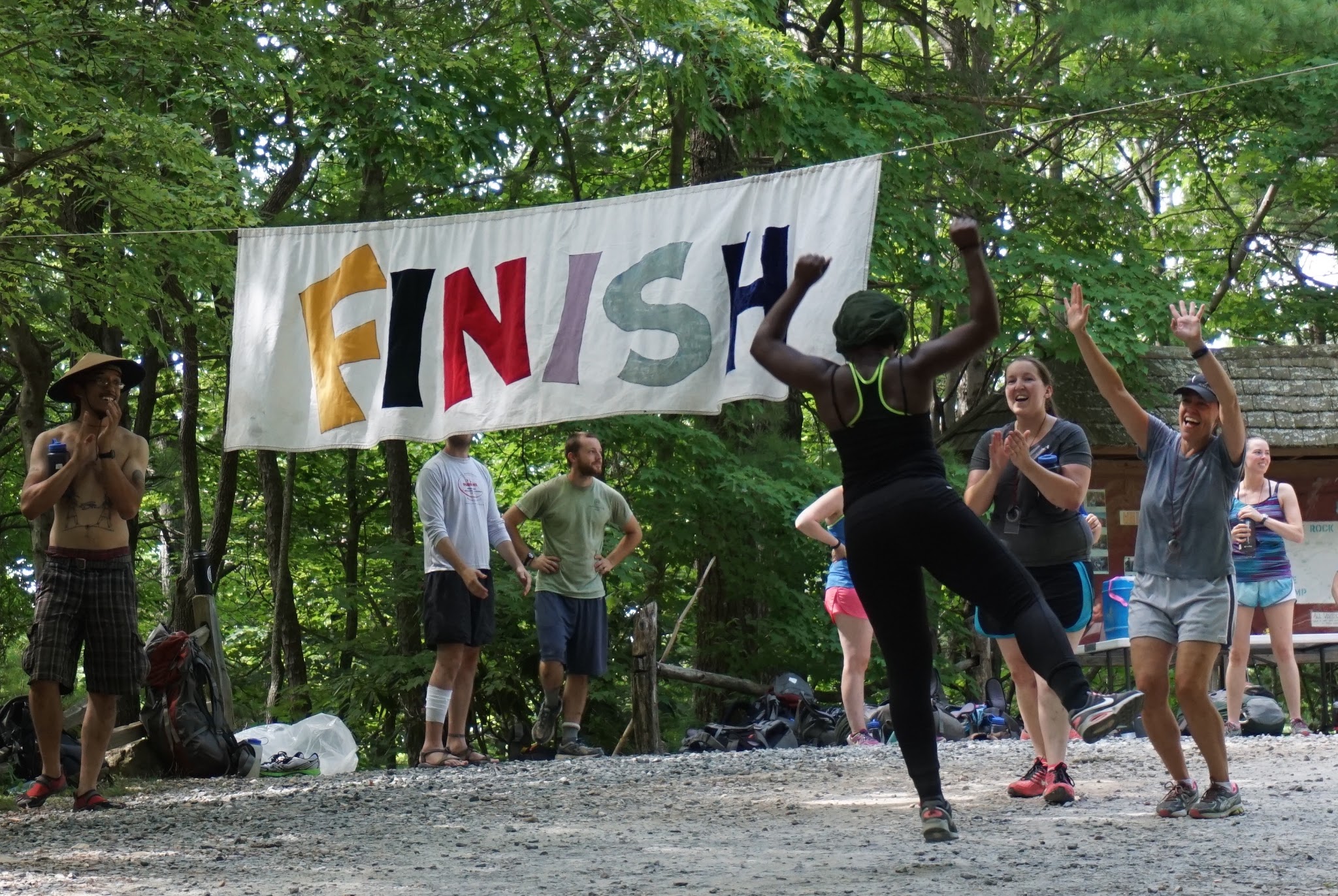
This is only a SAMPLE itinerary only. Adjustments will be made due to weather, programming area availability and group dynamics.
TEN THOUSAND ISLANDS, FL
Participants will paddle through lush mangrove tunnels in a land of contrast: between tropic and semi-tropic, land and sea, and salt and fresh water as they learn to work together to read tide charts, explore unique ecosystems, cook and set-up camp on white sandy beaches under the stars and paddle to new areas each day. Participants will also learn about what makes the Ten Thousand Islands famous worldwide, the environmental value the area adds, and how we can better take care of it. <Click to learn more about this course area.>
While in the Everglades/Ten Thousand Islands, you may be sleeping on the beach in tents with up to 1 other participant or on camping platforms in a personal bug tent. You will also be given a ground sheet and a foam sleeping pad to place under your sleeping bag.
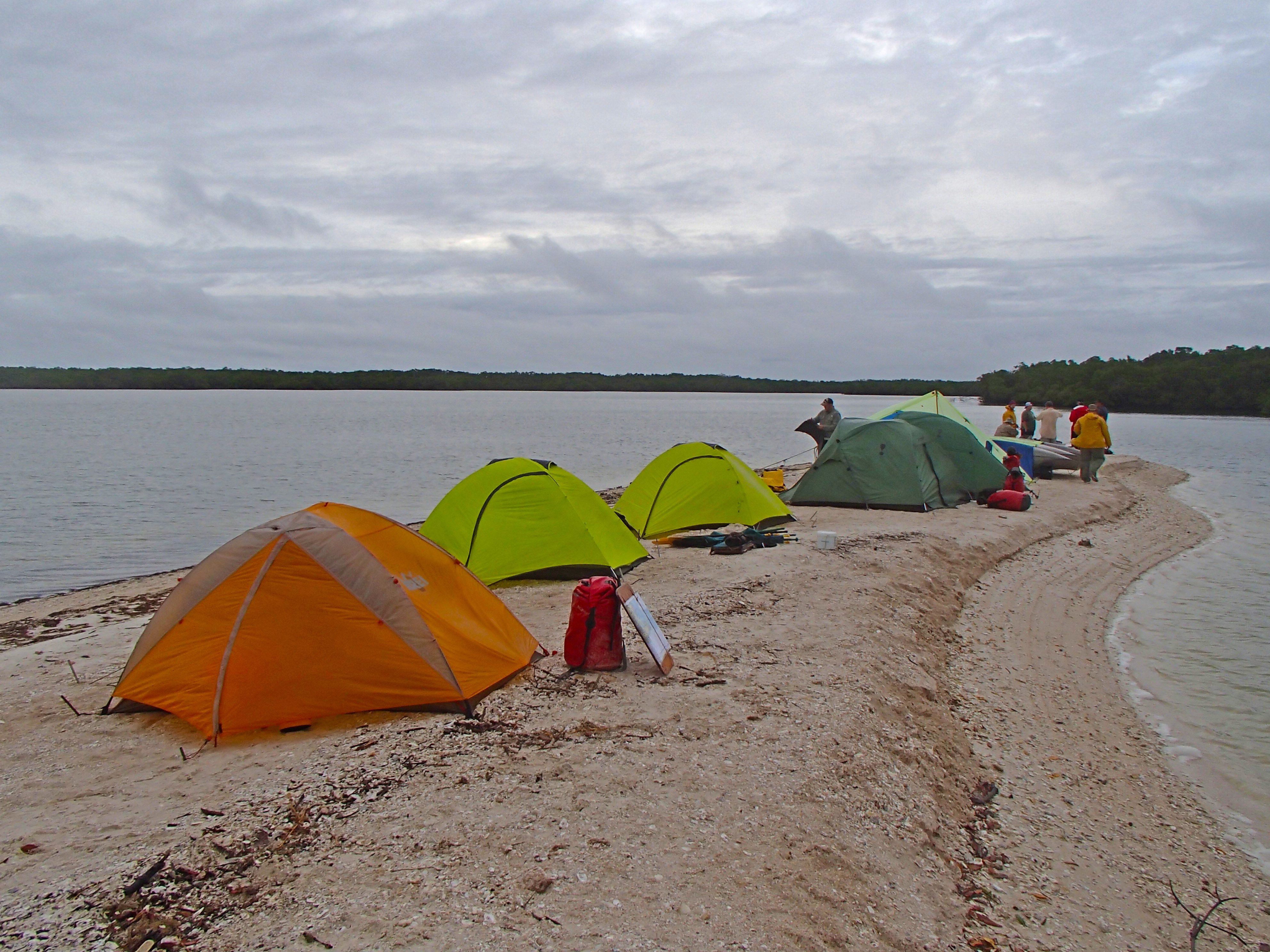
Here are some books that we encourage you to read as you plan for your course:
- The Outward Bound Wilderness First-Aid Handbook by Jeff Isaac
- Leave No Trace: A Practical Guide to the New Wilderness Ethic by Annette McGivney
- Liquid Land by Ted Levin
- Ten Thousand Islands by Randy Wayne Wright
- The Swamp by Michael Grunwald
- Stolen Water by W. Hodding Carter
The history of Outward Bound serving veterans dates to 1971 and the “Spartan Pathfinder” program run by the John F. Kennedy Center for Military Assistance. The purpose of the program was to use Outward Bound techniques to reorient soldiers with drug and disciplinary problems and “promote self-confidence and self-awareness through controlled stress in a wilderness environment.” From 1975 - 1981, the Dart-mouth Outward Bound Center and the Department of Psychiatry at Dartmouth Medical School began serving veterans working through Post Traumatic Stress and other mental health diagnoses.
In 1981 Dartmouth Outward Bound Center merged with Hurricane Island Outward Bound School and by 1983 Outward Bound for Veterans was born.
Since 2006 Outward Bound has served close to 10,000 Veterans and Active Duty service members. While the majority of the participants are veterans of Afghanistan and Iraq, we welcome veterans from any era to attend one of our courses.
The founder of the Vietnam veterans program and a guiding hand through many iterations of Outward Bound for Veterans was Army Colonel Bob Rheault. Colonel Rheault commanded both the 1st and 5th Special Forces Groups. He became an Outward Bound instructor after he left the Army, “because it was the closest thing to Special Forces that he could find.” For 32 years Colonel Rheault served as an Instructor, Program Director and President of the Hurricane Island Outward Bound School, retiring in 2001. Colonel Rheault passed away in 2013.

While you do not have to be a gifted athlete or in peak physical condition to attend an Outward Bound course, you do have to prepare for the challenges of Outward Bound.
There are two kinds of strength necessary to complete your course; physical and mental. Your body needs to be strong, but you must also come with an open mind, willing spirit and a cooperative attitude. Whether you paddle a canoe or kayak for six or eight hours, expedition with a 50+ pound pack for 10 miles or scale a rock wall, you will be pushed and rewarded on many levels.
Note to caffeine drinkers: If you drink coffee or caffeinated teas you will have access to these items on course. However, they will not be available in the amounts that you may be used to. You may want to cut back a bit before course because you will not be able drink these beverages on your regular schedule.
Note to tobacco/nicotine users: Please review the information in the Nicotine & Tobacco Policy tab below.
MENTAL PREPARATION
Consider and be prepared for:
Teamwork: Be ready to be part of a team. Think about other team experiences you may have had in the past. Remember what helped your team be successful. Plan on being a positive contributor during your course.
Living with Less: Look around and think about what you have and what you truly need. Things we may take for granted like hot running water, upholstered furniture and sidewalks will not be part of your experience. When you get into the routines of wilderness living, you may notice that life in the wilderness and life at home are similar in that they are ultimately about food, clothing, shelter and the relationships you have with those around you. Because the wilderness lifestyle is simple, you will leave behind non-essentials like deodorant, make up, electronic devices and books.
Being Away from Home: Whether it is the first or the 20th time you have been away from home, you might not have been this “out of touch.” Don’t be surprised if you feel homesick at some point. Please use your instructors and teammates as resources for support.
Compassion: Compassion is a pillar on which Outward Bound was built. Compassion can be shown in kind, thoughtful actions and can be practiced during course through active listening and understanding of other perspectives. You may find that you need to make compromises as you support your team. It is always important to remember that your attitude and actions affect everyone.
Group Discussion: Your instructors will lead group discussions as you debrief each day. Through coaching from your instructors, your group will practice positive communication and conflict resolution techniques. These skills help your group maintain respect for individual opinions no matter how they may differ. Hopefully, these lessons will extend to your everyday life. Be prepared to share your perspective and gain insight from others during these discussions.
PHYSICAL PREPARATION
Have fun and enjoy the adventure of preparation while training for your course! This is an excellent opportunity for you to get outside, get fit and explore your neighborhood's parks and recreation areas.
Adopt Healthy Habits: A great way to physically prepare is to adopt healthy habits. Reduce consumption of fatty foods, excessive alcohol and caffeine as these substances require a lot of water and oxygen to metabolize. Eat plenty of unrefined carbohydrates (i.e. whole grains). Drink water regularly instead of juice or soda. If you drink or use tobacco or tobacco products, it is essential to quit before you arrive. And last, but not least, arrive at course start well rested.
FITNESS AND TRAINING
• You do NOT have to be an athlete or highly-trained to attend an Outward Bound course.
• You DO have to be physically capable and active. Our courses are demanding. You will use your muscles in new and challenging ways.
• It takes strength and fitness to paddle a boat for six or eight hours a day, carry a 50+ pound pack for 5-10 miles or climb a rock wall. If you aren’t already involved in a fitness program, now is the time to start. Your efforts will pay off in enjoyment, comfort and fun.
> View our suggestions for building fitness, testing your heart rate and an eight week fitness plan.
PREPARATION FOR WATER ACTIVITIES
Endurance train at least three times a week on a rowing machine. If a rowing machine is not available, supplement with strength training three times a week by including sit-ups, pull-ups, push-ups or weight training that concentrates on your shoulders, stomach and back.
As always cardiovascular exercise like running, walking, swimming or riding a bike will get you heart pumping and set you up for success on course!
Due to Leave No Trace camping ethics, we seldom build fires. You will be cooking on gas camp stoves. With coaching from your instructors, you learn backcountry cooking techniques and are responsible for helping with the preparation of all meals. Your diet will be a mix of dehydrated foods, fresh fruits and vegetables. We use rice, beans, tortillas, granola, oatmeal, crackers, salami, cheese, peanut butter, jelly, tuna fish, pasta and trail mixes.
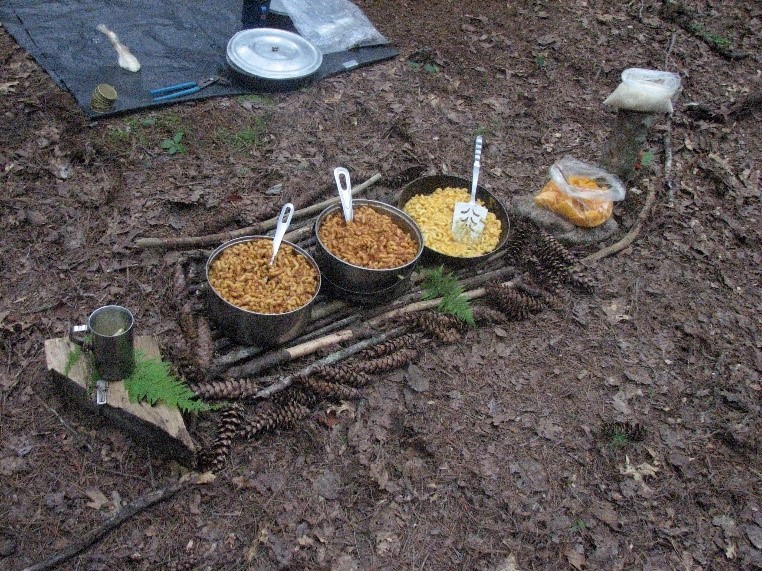
MEALS AT OUTWARD BOUND
The following list represents common meals at Outward Bound (this is not a menu)
Breakfast
- Bagels and cream cheese
- Pancakes with butter and syrup
- Cream of wheat
- Grits with cheese and dried fruit
- Grapenuts or Granola and soy milk or cow’s milk
- Oatmeal with raisins and brown sugar
- Huevos Rancheros: eggs, salsa, cheese and black beans on tortillas
Lunch
- Peanut butter and Jelly on tortillas
- Pizza: pepperoni, mozzarella, tomato paste, pita bread
- Hummus with carrots, cheese and crackers
- Salami with cheese and crackers
- Beans Galore: black beans, red beans, white beans, corn, onion, Italian dressing on tortillas
- Tuna and cheese on pita bread
Dinner
- Pasta Alfredo: Rotini with alfredo sauce and mushrooms
- Burritos: refried beans and rice with salsa and cheese
- Tuna Mac: Macaroni with cheese, parmesan cheese, tuna and milk
- Stir Fry: Rice and chicken with vegetables, coconut milk and curry powder
- Veggie Chili with rice, cheese, onion and cornbread
- Tacos: Natures Burger with tomato paste, cheese, onion and Tortilla
Drinks (other than water)
- Cocoa
- Tea/Coffee (in moderation)
- Drink mix
Snacks
- Fruit (oranges, apples)
- Trail mixes (many varieties)
- Goldfish crackers
- Pretzels
The North Carolina Outward Bound School (NCOBS) strives to accommodate applicants who have dietary restrictions.
Our courses are backcountry, wilderness-based programs. We purchase our course food in bulk. Prior to course start, your instructors plan your crew’s meals (breakfast, lunch, dinner and snacks). We travel expedition-style with approximately a week’s worth of food at a time. All course food must be packable and non-perishable. You prepare and eat meals together as a crew in a camp setting, under the supervision and guidance of your instructors. You will not have access to a dining hall or cafeteria. We do not permit participants to bring their own food or snacks unless authorized to do so by NCOBS.
Be prepared to try new foods. It is imperative for your well-being to replenish the calories you are expending each day.
Please complete the Dietary Allergen Questionnaire to inform Outward Bound of any dietary restrictions. This information will be reviewed on a case-by-case basis by our Medical Screener.
Food Allergies: Eight kinds of food cause most food allergies: cow's milk, eggs, peanuts, tree nuts, wheat, soy, fish and shellfish. Signs of a food allergy include a rash, or red, itchy skin; stuffy or itchy nose, sneezing, or itchy and teary eyes; vomiting, stomach cramps or diarrhea; angioedema or swelling; hoarseness, throat tightness or a lump in the throat; wheezing, chest tightness or trouble breathing. Some people with food allergies can have a serious reaction called anaphylaxis.
NCOBS cannot guarantee there will be no exposure to known allergens. If the applicant has had an anaphylactic response related to a dietary allergen, we must consider our remote wilderness area as we determine the appropriateness of our programs for the applicant.
Food Intolerance or Sensitivity: A food intolerance or a food sensitivity occurs when a person has difficulty digesting a food item. This can lead to symptoms such as intestinal gas, abdominal pain or diarrhea. If you are able to tolerate the food item in limited amounts, please let us know. It may broaden the range of foods we are able to provide.
Food Preference: Food preferences are choices that are made for reasons other than allergy, tolerance or sensitivity. We sincerely request that you think through your practice of limiting your food options while you are on course. Our primary goal is to meet students’ dietary allergies or intolerance/ sensitivities. The addition of food preferences could further influence the menu items we can provide.
Our staff members, who have had years of experience in the field, find that once students with food preferences engage in our rigorous backcountry, wilderness-based activities, those same students tend to (at least temporarily) broaden their food choices. We believe students may find these foods surprisingly appealing during their course due to their bodies’ increased need for calories.
Our wilderness courses are physically rigorous, and we recommend you prepare by increasing your cardiovascular fitness and quitting nicotine and tobacco products well before course start. We maintain a Zero-Tolerance Nicotine and Tobacco Policy on most courses.
However, to increase the accessibility of our Veteran, Educator and Professional programs, we follow an amended Nicotine and Tobacco Policy:
Use of tobacco (cigarettes/dip) or nicotine (gum, pouches, vape pens) is permitted in the following circumstances:
- The group has completed travel for the day.
- No group activities are occurring.
- Use occurs away from the campsite.
- Use occurs individually (e.g., no smoke circles).
Participants must get permission for use from their Instructors before each instance (to confirm it is an appropriate time and place) and Instructors will set a time limit to complete use and return to the group.
For nicotine vape pens – cartridges must be unopened, in original packaging and have approval from Instructors to be brought on course.
Nicotine patches are permitted on course for those who are already using patches as part of their tobacco cessation treatment.
Maintaining personal hygiene in the wilderness is important and is taught on every course. You will be outside while on course and won't have access to a shower or bath. You will be able to do basic cleanup every day: brush your teeth, wash your face and comb your hair. At the end of your course, you will be able to do a more thorough cleanup.
Since North Carolina Outward Bound is an outdoor program, you can expect to learn and use Leave No Trace camping techniques. Know that it is natural to have questions regarding sanitation in an outdoor setting. Your instructors will answer your questions and will teach you the hygienic and environmentally safe way to dispose of waste as well as techniques for basic cleanliness - don't hesitate to approach them with any questions or concerns
In our everyday lives, technology is always at our fingertips. By contrast, in the life of an Outward Bound participant, you have the unique opportunity to unplug and fully immerse yourself in the wilderness to connect with your crewmates and instructors.
Guidelines
NO:
- Electronic devices such as cell phones, GPS devices, asset tracking devices (such as Airtags), and/or any other wi-fi enabled electronic devices are not permitted while on course.
- No cell phone cameras allowed.
YES:
- Carry your cell phone with you to course start. Your cell will be locked in a group storage bin with your luggage at our facility while you are on course. You’ll be reunited with your cell phone at course end.
- Bring a camera to record the events of course – either a waterproof disposable camera or a digital camera with a small “dry bag” or Ziplock bag for storage. Our courses are rigorous and there is a risk of losing or damaging your camera.
Safety and Risk Management
Please review our Safety and Risk Management page.
SPECIFICS
Mail delivery is not available on 4-9 day courses.
If a family emergency occurs while the course is in progress, emergency messages can be relayed by calling our toll-free number (800-878-5258) on weekdays 8:30 AM – 5:00 PM eastern time. Prior to course start, you will receive an email that provides an after-hours and weekend emergency phone number.
WHAT WE SUPPLY
North Carolina Outward Bound School provides:
- sleeping bags
- sleeping pads
- shelter
- compass
- food
- water bottles
- cooking equipment
- eating utensils
- rain gear - unless otherwise notes on your packing list
We also provide activity-specific items based on your course type:
- backpacks
- rock climbing gear
- canoes, and/or
- sea kayaks
Please refer to the Packing List below for the items to bring to course.
WHERE TO SHOP
First, shop your closet or those of your family or friends - you might have many of these items already. Then start planning what you may need to buy, leaving yourself time to find sales or free shipping.
Many students shop for clothing and gear from the following retailers:
- Goodwill, other thrift stores, consignment stores
- Walmart, Target, Amazon, Old Navy, other large chain stores
- REI Co-Op
- Eastern Mountain Sports
- Sierra Trading Post
Plan ahead! When you arrive for course start, you will not have an opportunity to purchase forgotten items!
Please review the video How to Pack for Course Without Breaking the Bank below.
PACKING AND STORAGE
When packing, use a duffel bag or soft-sided luggage (if available) due to limited storage space at our facility.
When you arrive, your instructors will facilitate a process we call “duffel shuffle” that includes:
- Assessment of your clothing and gear with the route and the anticipated weather in mind. (Tip: save the tags from new purchases so you can return any unused items after course end.)
- Issue Outward Bound items you will use during course
- Stowing personal items not needed while on expedition such as travel clothes, cell phones, electronic devices, and wallets back into your travel luggage.
- Luggage will be transported to our facility and placed in locked storage until course end. Please leave any expensive or valuable items at home.
All items should be synthetic or wool (NOT cotton or denim) unless otherwise noted.
Fabric Types/Styles to Purchase: The Packing List reflects the layering principle. It is vital that all your clothing be comfortable, quick-drying, and warm. Review our Fabrics and Layering for the Wilderness blog on the importance of fabrics.
Quantity Ranges: You may determine the exact quantity based on your personal preference and budget. You will likely wear clothing items multiple times throughout course. You do not need to bring a separate outfit for each day.
If you have questions, please contact your Student Services Representative.
Upper Body
|
Quantity |
Item |
Description/Purpose |
|
1 |
Fleece jacket or pullover, medium weight |
To keep you warm when not active in camp, should be warm enough to be worn alone but thin enough to fit under an outer layer like a rain jacket |
|
1 |
Long sleeve shirt (base layer) |
Worn closest to skin, snug fitting, to provide warmth |
|
2 |
Long sleeve shirt, light weight |
Button up is preferred, worn over other clothing to protect from biting insects and sun |
|
2-4 |
T-shirts (synthetic) |
Not cotton, athletic shirts appropriate |
|
2-3 |
Sports bra |
If applicable |
Head and Face
|
Quantity |
Item |
Description/Purpose |
|
1 |
Beanie |
|
|
1 |
Wide-brimmed hat or baseball cap |
|
|
1 pair |
Sunglasses with case and retainer strap |
|
|
1 pair |
Prescription eyewear with case and retainer strap |
If applicable |
Lower Body
|
Quantity |
Item |
Description/Purpose |
|
1 |
Long pants (base layer) |
Worn closest to skin, snug fitting, to provide warmth. Athletic leggings and long underwear acceptable |
|
2 |
Pants, light weight, quick-drying |
Loose fitting preferred. Will be used for hiking |
|
2 |
Shorts, light weight, quick-drying |
5" minimum inseam |
|
4-6 |
Underwear |
|
Hands and Feet
|
Quantity |
Item |
Description/Purpose |
|
1 |
Gloves, light weight |
For warmth and/or sun and insect protection. Water resistant preferred. |
|
2-5 pairs |
Socks, medium weight |
Not cotton |
|
1 pair |
"Wet" shoes |
Closed toed and hard soled. Review our blog on how to choose shoes. |
|
1 pair |
Camp shoes |
Fast drying, closed toed, "Croc" style is a staff favorite. Review our blog on how to choose shoes. |
Personal Items and Toiletries
|
Quantity |
Item |
Description/Purpose |
|
1 |
Prescription medication |
If applicable |
|
1 |
LED headlamp with spare set of batteries |
Avoid USB/rechargeable headlamps |
|
1 |
Insect repellent |
Max 4oz bottle |
|
1 |
SPF 30+ sunscreen |
Max 4oz bottle |
|
1 |
Lip balm with SPF |
|
|
2-3 |
Bandana |
Multi-use item |
|
2-3 |
Pens or pencils |
For writing on course (we provide a journal) |
|
2-5 |
Gallon-sized zip lock bag |
For keeping items dry |
|
1 set |
Toiletries: toothbrush & toothpaste, haircare products (see Eye, Skin, and Hair Care section), Menstrual products (if applicable) |
To be used during course. Max 4oz each |
|
1 set |
Toiletries: shampoo & conditioner, soap |
For shower at course end. Max 4oz each |
|
1 |
Bath towel |
For shower at course end |
|
1 set |
Extra set of clothes for travel days |
|
|
1 |
Foot powder |
Gold Bond or similar. Max 4oz bottle |
Optional Items
|
Quantity |
Item |
Description/Purpose |
|
1 |
Watch with alarm |
Waterproof or water resistant (no smart watches) |
|
1 |
Packable camp chair |
Lightweight, foldable, like a "Crazy Creek" chair |
|
1 |
Camera; can be digital or disposable |
Bring extra batteries, memory card, extra film, etc. as needed |
|
1 |
Windbreaker, nylon |
- |
|
1 |
A “cover up” – lightweight fabric item (i.e. a twin sheet, a sarong, or other packable fabric). Can be cotton and a repurposed item. |
For discreet clothing changes and/or covering up from biting insects at night while sleeping |
|
1 |
Rain Gear (jacket and pants) |
For Adults on 18+ courses. Loose fitting; 100% waterproof, not water resistant. Must be two or three-layer Gore-Tex or similar high quality. Rain jacket preferred to have reinforced shoulders. Rain pants should have ¼ leg zipper at minimum. |
Maintaining personal hygiene in the wilderness is important and is taught on every course. You will be outside while on course and won't have access to a shower or bath. You will be able to do basic cleanup every day: brush your teeth, wash your face, and comb your hair. At the end of your course, you will be able to do a more thorough cleanup.
PRESCRIPTION EYEWEAR: GLASSES & CONTACTS
Please bring your prescription eyewear to course and any applicable backup options. For glasses a retaining band is necessary to prevent loss during an activity.
For participants who wear contact lenses, you must bring your prescription glasses as back up. Be sure to bring enough contact lens solution so you can be diligent in your contact lens routine while out on course.
Please be aware that the use of contact lenses in the backcountry does carry more risk than when at home. A great level of diligence and hygiene is required in ensuring you do not damage your eyes.
SKIN CARE
You will be outside during your course. To maintain your health and comfort, the best protection from biting insects, skin irritation and sunburn is a physical barrier of clothing. Bring the required clothing and gear listed – it's essential to your comfort and safety.
It is your responsibility to follow your instructor’s directions and monitor how your skin reacts to the changing environment. Let them know if you encounter skin concerns before they present a barrier to your participation.
If you are traveling by air to your course, please review the TSA Carry-on Requirements for liquids.
HAIR CARE
Here are a few tips caring for long, kinky, or curly hair while on course:
- Bring a comb, brush, or pick
- Protect your hair by covering it with a hair bonnet, silk scarf, headwrap, durag, loc tube, bandana, etc.
- Use a bandana, head wrap, hair scrunchies, etc., to keep hair out of your face
- Bring 3oz hair oil
Before course, consider putting your hair in a protective style, allowing enough time for your head to adjust prior to the start of your Outward Bound course. Be sure that your protective style will fit underneath a helmet. Suggested protective styles include:
- Box Braids
- French Braids
- Feed-in Braids
- Cornrows
- Faux Locs
- Two Strand Twists
- Plaits
- Flat Twists
Increased physical activity during Outward Bound may cause a change in your menstrual cycle. Prepare your menstruation kit using a zip lock bag even if you don’t expect your cycle during course.
Items to include:
- Menstruation products such as tampons, pads, panty liners, and menstrual cups. Bring more than you would typically use. Absorption underwear is not recommended.
- 1 small travel pack of disposable wipes or bandana. Our instructors will teach appropriate backcountry techniques for basic cleanliness.
- 1 small travel-size bottle of hand sanitizer
- 1 to 2 extra pairs of underwear
We practice Leave No Trace camping techniques. Therefore, we pack out what we pack in. Instructors will distribute small opaque zip lock bags and small stuff sack for your individual storage of used items.You will dispose of any used items either during re-supplies (approximately every three to seven days) or at course end.
Your instructors are experienced in addressing menstruation care questions or concerns while on course. Don’t hesitate to ask them questions.
Participants will not be permitted to begin their course without their required medications OR with new medications not approved by our Medical Screener.
All medications (prescription, non-prescription and over-the-counter) must:
- Be listed in the applicant’s medical information
- Be approved by our Medical Screener prior to course
- Accompany the participant on course
- Be in the original medication container with the prescription label intact
Your medication container should not include other medications, vitamins or supplements. If possible, bring a double supply.
Do not bring non-prescription medications such as aspirin, Advil, etc., unless they are listed in your medical information. We have a medical kit that contains these medications.
Medication updates that occur after applicants are cleared to participate could affect their status on course. Please update the Student Services Department with any medication changes such as:
- Starting a new medication
- Stopping an existing medication
- Dosage change of an existing medication
For participants on youth courses, our instructors carry all prescription medications, with the exception of birth control and emergency medications such as EpiPens or rescue asthma inhalers.
For participants on adult (age 18+) courses, we encourage participants to store their medication(s) container(s) in a zip-lock bag for protection. Pill sorters are not recommended.
You must notify Outward Bound should any medical, psychological, behavioral, or legal situations occur after the application and medical review process have been completed. Certain situations may affect the applicant’s course status.
Please review our comprehensive information onTick and Mosquito-Borne Disease Facts and Prevention.
In preparation for your upcoming course, we remind you to adhere to the clothing and gear list. We encourage parents/guardians of our youth participants to have a conversation regarding the importance of wearing long sleeves and long pants even when hot and humid to reduce the chances of bug bites, including mosquitoes and ticks. It is crucial that all students understand the need to follow the instructions of our staff in all regards, including expectations of self-care.
An Outward Bound representative will meet ALL arrivals in Terminal 2 baggage claim (lower level) across from carousel number 3 and near the Delta Baggage Services counter. Reference FLL Terminal 2 map.
North Carolina Outward Bound strongly suggests that you wear a mask while on planes and in other crowded, confined spaces during your travel.
Look for our representative wearing a shirt or hat with an Outward Bound logo and/or carrying an Outward Bound sign. Our representative will have a list of all student names and will note your arrival.
Our supervision officially begins when students depart the airport by NCOB vehicle or charter transportation.
Be Prepared - Determine a Backup Travel Plan
Please reference our COVID-19 Program Protocols.
We recommend testing for COVID-19 within 24-hours of travel to course to avoid traveling or arriving to course when ill.
Should you need to depart Outward Bound due to illness:
- on course start day - travel plans must be adjusted that day
- during course - you must depart within 48 hours
NCOBS or our travel agent will assist coordinating your departure from course, which may include an overnight hotel stay.
Please reference the CDC recommendations for Protecting Yourself When Using Transportation and Considerations for Travelers.
If you are traveling by air, be aware of TSA guidelines. To avoid TSA taking items out of your carry-on luggage (like insect repellent and sunscreen), pack these items in your checked luggage or do not exceed size specifications. For more information please visit the TSA website: Transportation Security Administration - Carry-ons
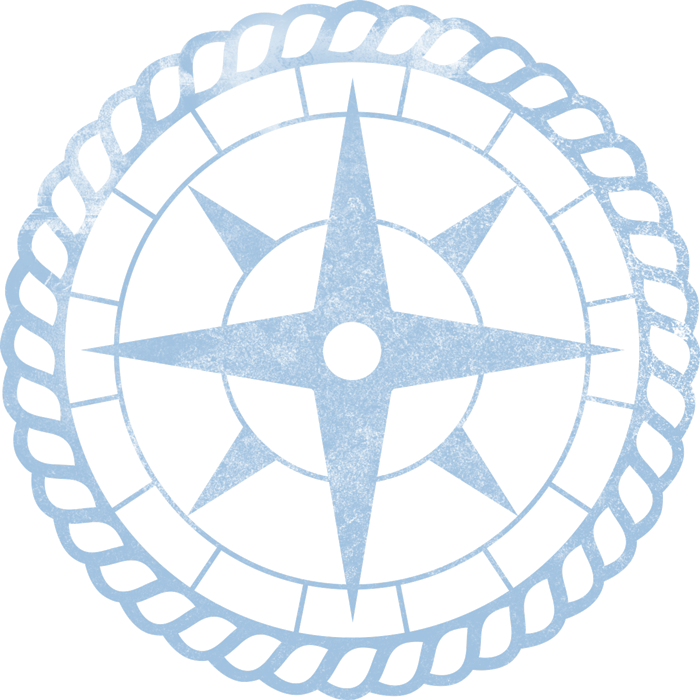
Sign Up for Updates
Stay informed on North Carolina news and updates! Please fill out the form below to begin receiving our email newsletter.

